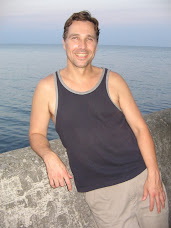Every once in a while, a TV series grabs me by the throat.
Mostly, I give in rather than resist. But I expect a lot in return. Fans of the
show know that the BBC's Spooks can boast of some of the finest writing,
acting, and directing on TV. For ten seasons, the story followed the
professional and private lives of a group of MI5 operatives, with one man,
Harry Pearce, the head of counter-terrorism, at its core. The show enjoyed a healthy
following at home and abroad.
For seven years, the series got better with each season.
Season eight remained strong, even while veering slightly off course to
concentrate on CIA involvement in the UK. (The show was re-branded as MI-5
for American audiences, who seem to prefer things a bit more literal and a lot
more obvious. I give you the disastrous Little Britain USA and the
American Queer As Folk, if you need further proof.)
I was glad when series eight ended, though, hoping one
lesser year would not turn into two, and praying the American flirtation would
soon be over. In fact, far worse lay just ahead. One of the series' trademarks
is the sudden and unexpected endings that befall some of its more popular
characters. This, we are to believe, is what actually happens to spies. While
it was maddening to see them go, the leavings were usually spectacular in
dramatic terms.
The challenge, of course, was to fill those roles in a way
that the previous agents would not be missed too much. For eight years, they
hit the bulls-eye every time. Tom became Adam became Lucas; Zoe became Fiona
became Ros. And you held your breath, because it just got better. With Peter
Firth as Harry Pearce, the one holdout year after year, the series had casting
magic.
Then disaster struck. Someone at Kudos, the show's
producers, must have decided the show needed sprucing up. They hired a writing
duo whose process is best described as schizophrenic. Asked to describe the
process, the writers revealed their preference for a tag-team approach. Each
takes turns writing five pages before passing the script along to the other.
Even more revealing, at least to me, was their idolization of Joss Whedon, the
new king of Hollywood blockbusters. From subtle and layered, the show suddenly became
little more than an action cartoon.
The new writers seemed to think it great fun to take
liberties with the characters in ways that appalled and dismayed anyone who had
enjoyed the careful building of each agent's psychological profile and
background. The adage seemed to be, when in need of tension turn one of your
best characters into a villain. Preferably one who has not been set up in any
way to show such traits previously. The inept desecration and dispatching of
Lucas North's character as a terrorist infiltrator in season nine was not the
first nail in the show's coffin, but it would prove its most unpopular with
many.
In the show's final two seasons, cheap tricks and shock
tactics abound: improbable plot turnarounds, an over-reliance on technology,
and action spat out at machine-gun speed. Tellingly, characters are relegated
to stating the obvious to one another to keep the story rolling: "Hey,
Tariq, better answer that phone. It might be the bad guy calling." Because
we might not be able to figure it out, otherwise, right?
Where previously plot resolutions came from character,
suddenly they were the result of "new" technology that sounds sketchy at best
and unbelievable at worst. Realistic threats are ditched in favour of dime
store hobgoblins, like fake bio-toxins and imaginary ethno-genetic bombs. Even
the erstwhile Peter Firth, as director Harry Pearce, the only actor to make it
through all ten seasons, looks unconvinced by much of what he has to say.
Never before has such a great series gone so thoroughly and
regrettably down in flames. It would be akin to putting the sequel to A
Streetcar Named Desire in the hands of Sacha Baron Cohen. Who would do such
a thing?
Kudos and BBC, you have a lot to answer for.
-----
Jeffrey Round is a writer of contemporary fiction, equally
at home in different genres. His first two books, A Cage of Bones and The P-town Murders, were
listed on AfterElton's Top 100 Gay Books. His most
recent Dundurn title is Lake
On The Mountain, a literary-thriller and first in the Dan Sharp
Mystery series. He is author of the Bradford Fairfax comic mystery series, whose
style he describes as "a cross between Oscar Wilde and Agatha Christie." He is
also a film/stage director, television producer, and songwriter. Jeffrey’s
Blog, A Writer's Half-Life, has been syndicated online. Visit his
website: www.jeffreyround.com.






No comments:
Post a Comment